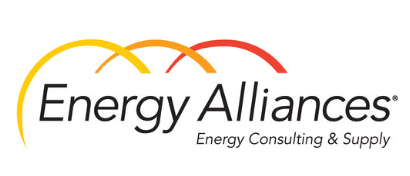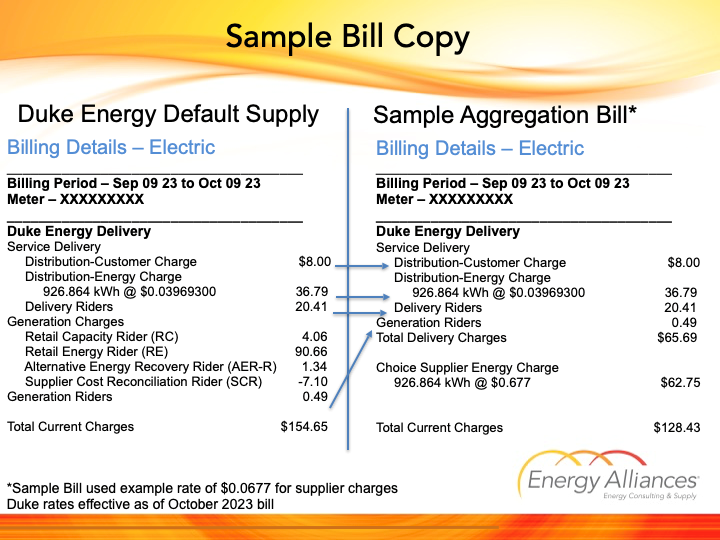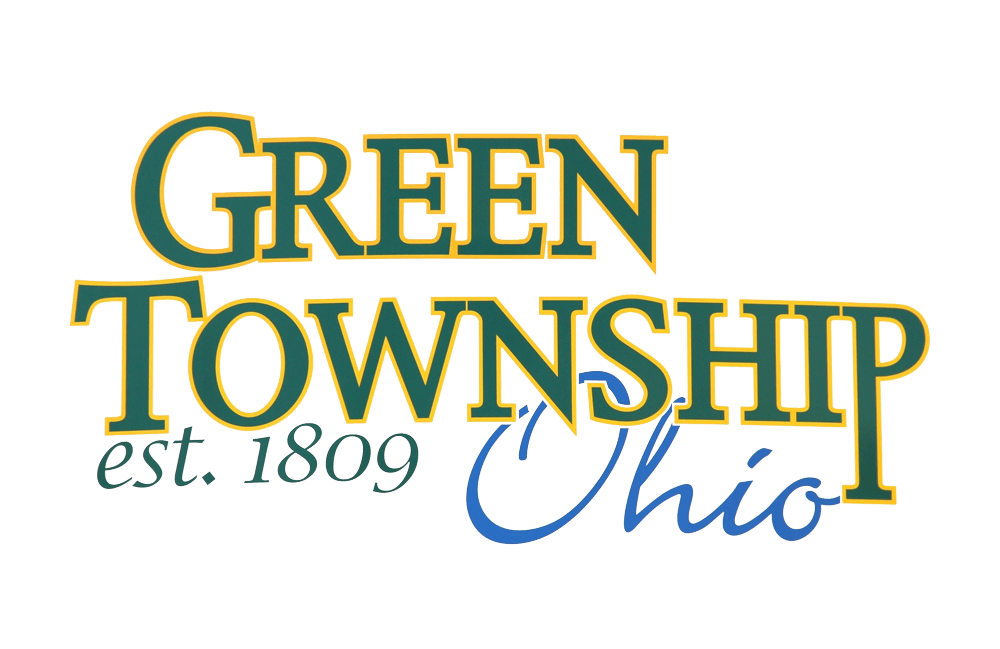green township
Gas and Electric Aggregation

There has been some misinformation being shared on social media regarding our resident’s Duke bills. As a clarification we are sharing a sample bill comparison.
You will either have Duke Default supply(left), Aggregation(right), or your own 3rd party supplier (will look the same as an aggregation bill).
EVERYONE has a supplier and supply charge. There are 2 parts to your electric bill, DELIVERY, these charges are consistent to EVERY Duke user, and GENERATION, the actual cost of Electricity, this is the only portion of your bill where a change can be made.
When you have an aggregation or 3rd party company you will see the CHOICE SUPPLIER ENERGY CHARGE (right 2nd from the bottom) which replaces RETAIL CAPACITY RIDER, RETAIL ENERGY RIDER, ALTERNATIVE ENERGY RECOVERY RIDER, SUPPLIER COST RECONCILIATION RIDER.
The Duke average PTC (Price to Compare) in Green Township is $.0818 per kWh, the Green aggregation price in their aggregation is $0.069.
That means if you are on the program and use 1000 kWh per month you save about $13.
These are the facts regarding your bill. If you have any questions or would like to be enrolled in the programs, call Energy Alliances at 513-794-5555.
Finally, if your bill has increased, please review the usage charts on your bill. If the usage is increasing, so will your bill. It is the most likely reason for increased utility bills.

The Electric Aggregation:
Green Township along with Energy Alliances has negotiated with
Dynegy for electric rate of 9.36¢ per kWh that will expire on the June 2026.
The Gas Aggregation:
Green Township along with Energy Alliances has negotiated with
AEP for the gas rate of $0.5894 per ccf which is 30% decrease from the current aggregation rate of $0.839 per ccf. Starting November 2024 bill and continuing through the October 2025 bill.
Enrollment Is Easy:
Being part of an opt-out aggregation program is a simple and safe alternative. The aggregation program(s) shown above are approved and monitored by your community's officials. Don't be misled by door-to-door salespeople and push telemarketers who hide their motives by misleading residents on price or who they actually represent.
Questions:
Your energy supplier(s) can answer most program questions. In addition, the Energy Alliances team is available Monday-Friday 9am to 5 pm by phone at (513) 794-5555 or (800) 735-0359, or you can leave a message and they will get back to you as soon as possible.
NOTICE SCAM ALERTS
Energy Alliances, Inc., your aggregation partner, wanted to alert you to the fact that there are solicitors in the area making phone calls and going door to door & are in some retail stores.
The sales tactics for the above solicitations are aggressive, sometimes misleading and many times in violation of the Public Utility Commission’s rules for marketing. Additionally, terms and conditions often include low introductory prices and purposely hide, in fine …print, the often exorbitant price after the relatively short (1 to 3 month) introductory term. These offers may also include hefty early termination fees and/or other terms which may be objectionable to the customer (such as automatic roll-over provisions). Many times, door-to-door solicitors ask to see a resident’s Duke bill on the pretext of confirming their current rate, then obtain pertinent information from the bill and switch the account without the resident’s consent or knowledge. Residents should be cautioned to never let anyone trying to sell them something see a copy of their bill.
Residents should be aware that PUCO regulations require sales agents to immediately identify themselves and their company and explain why they are speaking with them. Solicitors must wear an identification badge displaying their photo and full name and the name, logo, and phone number of the company they are representing.
Residents who feel they were pressured into switching have rights: they can immediately call Duke Energy to rescind their enrollment or wait for the Duke Energy letter acknowledging the switch, then call the number provided to rescind the switch during the allotted rescission period.
If a resident feels they were inappropriately switched, they can call the PUCO at (800) 686-PUCO (7826) and lodge a complaint. Residents should always write down the company, the name of the person they spoke with and any other pertinent information (such as promises made, prices and terms offered, etc.). They can also use their cell phone to take a photo of the solicitor’s badge and get a supervisor’s phone number for their records.
Community aggregation programs continue to be one of the best ways for residents to get a reliable energy supply at a reasonable price from a trustworthy company that community leaders have vetted and chosen.
What is Governmental Aggregation?
Ohio’s laws allow for communities – such as townships, to form the aggregated buying groups on behalf of their citizens. The governmental aggregator chooses an outside supplier for all of the customer-members in its group. Aggregation programs can be formed to buy natural gas, electricity or both.
All governmental aggregators buying electricity must be certified by the PUCO. Communities that aggregate to buy natural gas are required to be certified by the PUCO unless they aggregate under an Ohio Constitution provision which allows “home rule” or the right for communities to take action under their own charters. If an aggregator is going to provide natural gas and/or electric buying services, it must be certified separately for each industry. Certification by the PUCO, means they have met strict requirements for doing business in Ohio. Therefore, you can participate with confidence.
The law allows for opt-in aggregation or opt-out aggregation.
Opt-in Aggregation
Opt-in aggregation is a program that permits each customer to sign up individually to participate in the program. If the local government chooses Opt-in aggregation, it can proceed to develop a plan and start signing up customers. The plan must include all rates and terms for customers to consider when deciding to join.
Opt-out Aggregation
Opt-out aggregation is a program that automatically enrolls all local residents, unless they individually opt-out of the program (choose not to be included). If a community chooses this form of aggregation, a number of steps are required:
- A majority of voters must authorize opt-out aggregation in an election. The issue appears on a primary or general election ballot for your consideration.
- If authorized by a majority of the vote, the local government must form a plan of operation and management. They must also hold at least two public hearings to allow customers to voice any concerns over the proposed plan.
- Once the local government has adopted the plan, each customer to be aggregated must be notified that they will be automatically enrolled in the program unless they specifically elect not to participate. This notification must also state the rates, charges, and other terms and conditions of enrollment in the program. The opt-out notice is usually a letter accompanied by a post card to be mailed back if you do not want to participate or sometimes, a phone number to call or web site to visit to opt-out.
- Natural gas aggregation customers may opt-out every two years without paying a switching fee. Electric aggregation customers may opt-out every three years without paying a switching fee.
Deciding to stay with the Aggregation
When deciding to join an “opt-in” government aggregation or deciding whether to stay in an “opt-out” government aggregation, here are some things to think about:
- The goal of the buying group –will the aggregator be looking for the lowest price, sources used to generate the electricity, or additional services when finding a supplier?
- Number of group members – larger groups will usually have better “buying power”.
- Length of the contract – how long is the contract and how will it be renewed?
- Terms and conditions – be sure you read and understand them, including membership requirements, how you will be billed, and any fees.
Eligibility
For both natural gas and electric aggregation, customers who are already enrolled in the Percentage of Income Payment Plan (PIPP – a payment plan for past-due bills) are NOT eligible.
For natural gas aggregation, the only other customers who are not eligible to participate are those that are already under individual contracts with suppliers as part of a natural gas choice program. These customers will not appear on eligible customer lists provided to the governmental aggregator or the governmental aggregator’s chosen supplier.
For electric aggregation, most customers are eligible and their names will appear on customer lists provided to the governmental aggregator or its chosen supplier. It is important to note that if recently switched to a supplier and your community aggregates, you should return the opt-out notice if you do not wish to be switched to the aggregations’ supplier. That is a decision for you to make. You will want to talk to your chosen supplier if you consider switching to the aggregation’s supplier to find out if there are any penalties for the early cancellation of the contract.
Dynegy Energy Services FAQ’s
Billing and Payment
You will continue to receive one bill each month from your local utility. The amount that you owe to Dynegy will be separately stated on that bill and your payment for Generation service will be forwarded by your local utility to Dynegy.
Outages
You will continue to call your local electric or gas distribution company for all service related issues, such as outages.
Begin Saving Now
If you would like to switch back to Duke Energy Ohio, or any other company, there is no cancellation or termination fee if you decide to cancel your electric aggregation participation in the future.
ENROLLMENT IS EASY
Being part of an opt-out aggregation program is a simple and safe alternative. The aggregation program(s) shown above are approved and monitored by your community's officials. Don't be misled by door-to-door salespeople and push telemarketers who hide their motives by misleading residents on price or who they actually represent.
QUESTIONS?
Your energy supplier(s) can answer most program questions. In addition, the Energy Alliances team is available Monday-Friday 9am to 5 pm by phone at (513) 794-5555 or (800) 735-0359, or you can leave a message and we will get back to you as soon as possible.


